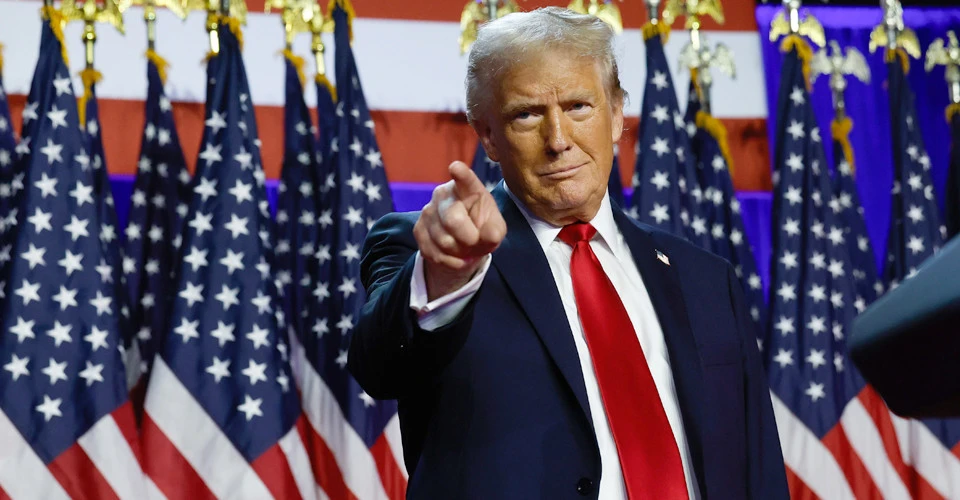
Trump's aggressive rhetoric shocks as it targets U.S. allies - international expert
International relations expert Maksym Nesvitailov says that it is difficult to understand why Donald Trump has started using aggressive rhetoric exclusively against U.S. allies
He said this on Espreso TV.
"It is truly difficult to understand what is happening right now. There can be various explanations for Trump's statements, but no one will tell you they truly understand what is actually going on. There can be countless versions of these events and statements. However, none of them seem to add up. One version regarding Canada is that they want to secure a strong negotiating position on customs policy. But what does Denmark have to do with this? For instance, the fact that Trump does not rule out using the army to seize Greenland and to reclaim the Panama Canal. The most interesting and at the same time strange aspect is that all this aggressive rhetoric from Trump is directed at allies. Canada is not an enemy of the U.S.; these two countries have never been at odds in modern history. Now, Donald Trump is openly threatening Canada with occupation," explained Nesvitailov.
According to the expert, Donald Trump's rhetoric is beginning to resemble the statements of Russian dictator Putin.
"It’s not a joke when the leader of one independent state threatens another state with occupation. This rhetoric reminds us of one dictator, when we were all outraged by 'like it or not, endure it, my beauty,' and now we say that Trump is joking. When he threatens a NATO country, how should this be understood? When Elon Musk interferes in elections in Germany and calls for the overthrow of the constitutional regime in the UK, it’s no longer a joke," he added.
How Trump wants to 'annex' other territories to the U.S.
Panama Canal
On December 22, Trump stated that Panama allegedly charges excessive fees for the use of the Panama Canal.
He argued that if "the principles, both moral and legal, of this generous gesture of gifting are not upheld, then we will demand the return of the Panama Canal to the United States of America in full, quickly and without questions."
Panama’s President José Raúl Molino stated that "every square meter of the Panama Canal and its adjacent territories belongs to Panama."
The U.S. built the Panama Canal in the early 1900s to assist commercial and military ships in traveling between its coasts.
In 1999, the U.S. relinquished ownership of the waterway, more than 20 years after then-President Jimmy Carter signed the agreement with Panama.
The newly elected U.S. President Donald Trump, in his Christmas greeting, once again expressed aspirations for the Panama Canal, Canada, and Greenland.
Greenland
During his first term, Trump stated that he was considering the possibility of the U.S. purchasing Greenland and canceled a state visit to Denmark after Danish officials stated that the autonomous territory, which is part of the kingdom, was not for sale.
On December 22, Trump again declared U.S. intentions to control Greenland: "For the sake of national security and freedom worldwide, the United States of America considers ownership and control of Greenland to be an absolute necessity."
Prime Minister Múte Egede stated that Greenland is not for sale.
"Greenland is ours. We are not for sale and will never be for sale. We must not lose our long struggle for freedom," he said.
Following this, Denmark's Minister of Defense Troels Lund Poulsen announced that the country is increasing its defense spending on the island. Poulsen called this announcement "ironic," as Trump claimed that ownership and control of Greenland are "an absolute necessity" for the U.S.
On January 6, the King of Denmark modified the royal coat of arms, making the symbols of Greenland and the Faroe Islands more prominent, which was perceived as a rebuke to Donald Trump after his claims to Greenland.
Canada
On November 29, U.S. President-elect Donald Trump told Canadian Prime Minister Justin Trudeau that if Washington's 25% trade tariffs "kill" Canada's economy, the country should become the 51st state of the U.S.
On December 10, Trump referred to Canada's Trudeau in his social media as "the governor of the great state of Canada." On December 18, he again floated the idea of making Canada the 51st state, citing the significant American subsidies Canada receives. On January 6, Trump reiterated the idea of making Canada the 51st state while commenting on Prime Minister Justin Trudeau’s resignation.
- News











































